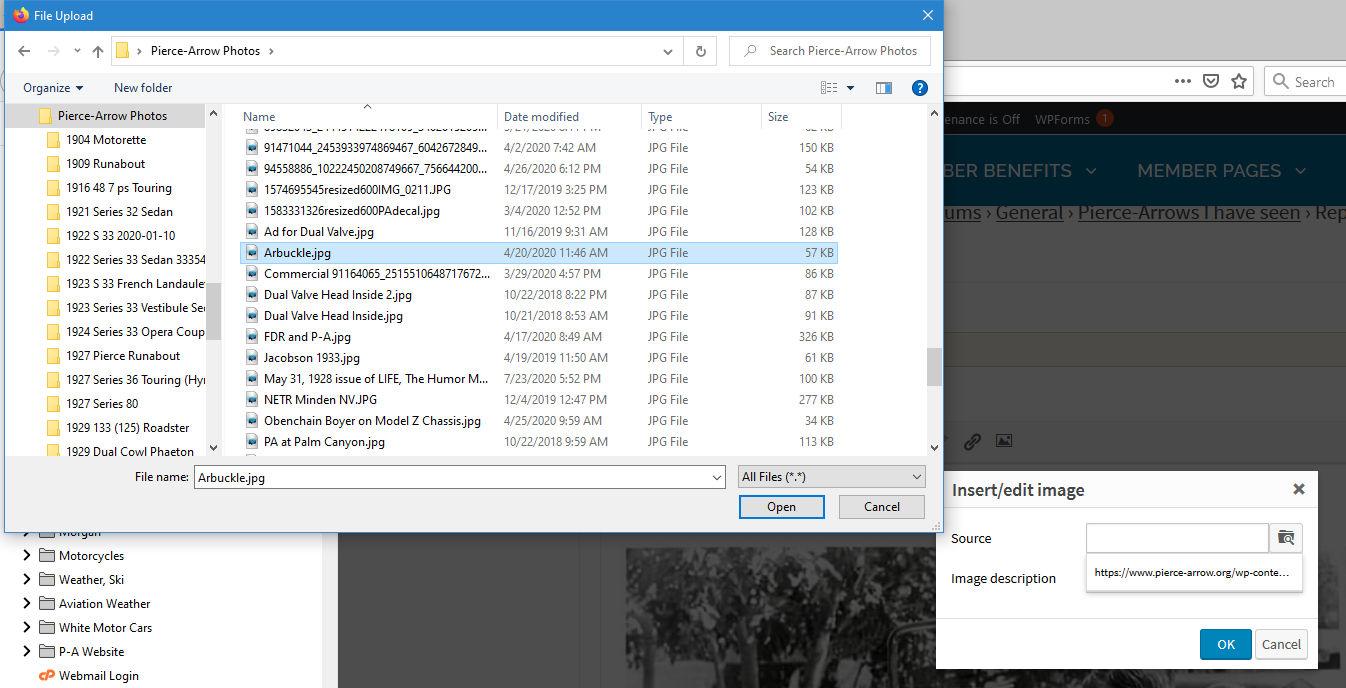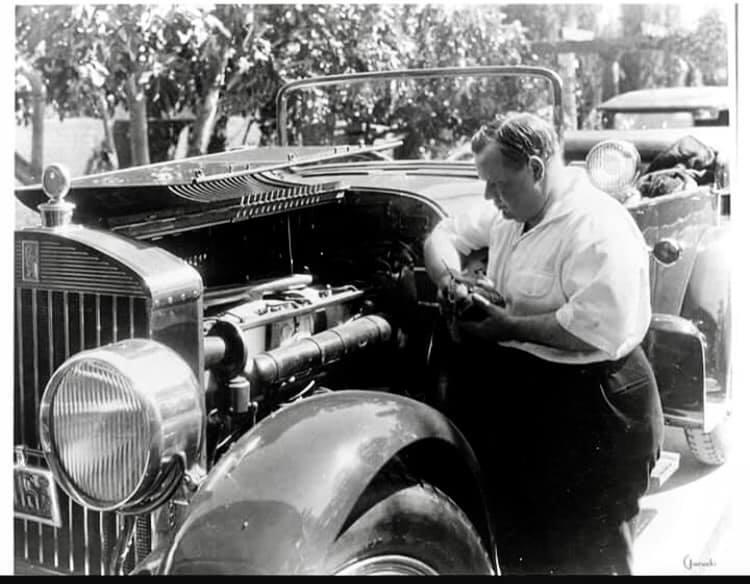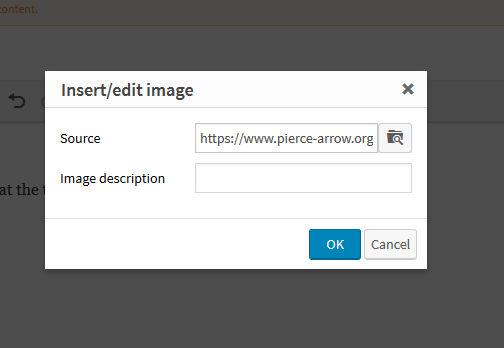- Home
- About Us
- Join/Renew
- Member Benefits
- Member Pages
- Log In
- Help
- Museum Store
Glad it helped.
Dave
Curtis,
The first thing you should check are the bolt tightness on the drive couplings shown in the picture. The lockwasher on the foreground bolt on the left disk is not compressed indicating that that bolt is not tight. Also make sure the bolt holes aren’t wallowed out. If the coupling disks are deteriorated, they may need replacing. I am not aware of anywhere that sells then, but they can be made. I believe the material is available from supply companies like McMaster-Carr. Someone else may know of a source of pre-made ones.
As far as the brushes are concerned, I don’t know why worn brushes would cause a wobble. I have not changed brushes on a 12 cyl generator, but on most generators it is not too difficult. I’ll let someone else with more experience speak to that.
Dave
I didn’t know it got that cold in your neck of the woods. Cold weather is a really good reason to run anti-freeze instead of plain water. In my part of California, below 32 degree days are uncommon and if we have a cold snap (29-30 degrees) putting an old fashioned style trouble light on the floor under the engine provides plenty of heat to keep things from freezing.
The only downside to the old style anti freeze that I can see is it should be changed more often.
Hi Randy,
I have been researching coolants for a PASB article and as yet have NOT found anything definitive that says any long life coolant (like Prestone All Vehicles) is safe in older cars. The newer long life coolants (OAT technology) have a tendency to dissolve older gasket sealants and solder used in brass radiators. I use water with Pencool 3000 (anti corrosive/ pump lubricant) in my Pierces. Plain water actually transfers heat better than anti-freeze. Also, in non-pressurized systems anti-freeze tends to foam and go out the overflow. Anti-freeze does raise the boiling point some.
If you really want to use an anti-freeze, I would suggest going with the old style (IAT technology) anti-freeze. Most auto parts stores still carry it and it is specifically label “Old Style” or something similar.
Dave
Curtis,
The proposal for a different Message Board was brought about by a recurring problem on the current Message Board. Every so often some of the recent posts just disappear. A month or so ago a number of posts disappeared and some have not yet been fully recovered. The web folks have gotten good at recovering the current posts when they disappear, so the problem is not very visible to members, unless you frequently visit the Message Board.
The web committee has attempted to find and fix the problem for months, so far without success. The software vendor has also not been able to resolve the issue. I am familiar with the issue because I have been letting the web committee know every time I see a post(s) disappear. I think the preferred solution is to fix what we have if that can be done. Much time has been spent on it, so far unsuccessfully.
Going to the AACA Forum is one possible solution. It has some advantages and some disadvantages. I am going to watch the presentation about the AACA site before I make up my mind on how I feel about it. If you are interested in seeing the presentation, see Rich Lange’s post above.
Dave
Richard,
When you click on the camera, a window should open with all of the files on your computer. Select the name of the photo you want and click “open”. You may have to hunt a little for what you are looking for. It may take a while for the photo to upload at this point. The Source window will say “Please Wait”. Once a file name appears in the source box, click OK. What appears in the Source box will be the name assigned by the website so it won’t be the name of your file. I am using a Windows computer. A Mac or Mobile Device may work a little differently but should be similar.
Dave


Richard,
To add images click on the picture icon at the top of the Reply box.

A window will pop up that allows you to locate the photo on your computer, click on the camera icon, find the photo on you computer and click OK. You can do this multiple times for multiple photos.

Don’t forget to click “Submit” when you are done uploading photos. Allow time for the photos to upload. It is best of the photos are around 1600 x — pixels in size although not mandatory.
I am looking forward to seeing your photos.
Dave
Richard,
Water Pump specific grease is available from Restoration Supply in Escondito. https://restorationstuff.com/ Lubriplate 115 I believe. Don’t use regular or Marine grease as it will gum up your cooling system.
Even with non-ethanol gas, a stabilizer such as Stabil is a good idea if the car is going to sit for a while, such as over winter.
I had a conversation with Paul Johnson after my last post and he suggested you check with the engine re-builder to make sure they cleaned the crankshaft oil passages during rebuild if you are going to use a detergent oil. He had a bad experience where a plug of sludge broke free from an uncleaned crankshaft oil passage and trashed a bearing.
Dave
Richard,
Adding to the comments above, if you have the opportunity to run non ethanol gas, I think it’s a good idea. Ethanol may dissolve older rubber parts in the fuel system, plus if the car sits for a while the ethanol can separate out. In addition to driveability problems, it will absorb moisture from the air (maybe not much of a problem in New Mexico) which can rust out the gas tank if the car sits much. Because of the cost of non-ethanol fuel here ($5.50/GAL) in Cal., I run normal pump gas until near the end of the driving season, then run non-ethanol with a fuel stabilizer so that is what’s in the tank over the winter.
As far as oil is concerned, there are a multitude of opinions out there. You indicate your engine is freshly rebuilt and should be clean inside. In that case a detergent oil should be OK. I run Delo 400 15-40 in my cars (rebuilt engines) and haven’t had any problems. It is a high detergent oil, primarily for diesel engines, but also rated for gasoline engines. Shell Rotella is similar. If your engine is older and you don’t know what type of oil has been used in it, a non-detergent may be your safest bet as Paul mentioned. The best way to know for sure is to drop the pan and check for sludge.
The other oil controversy out there is the amount of zinc/phosphorus in the oil. Our cars were built before those additives were invented (1940s) so I don’t worry much about it. Do some internet research and you can form your own opinion on the subject. There is a LOT of information out there on the subject, some of it good, some of it uninformed opinion.
Have fun with the car.
Dave
It’s a nice looking car. PAS records are by Serial number, so you would need to contact Hyman to get that unless someone recognizes the car.
Dave
Ron,
It does sound like a fuel issue, but a quick check of the spark quality will help eliminate the ignition as a problem. Pull one of the plug wires and place the end 1/4″ from the block. You should get a strong blue spark when trying to start. If it is weak or yellow, you need to correct that before you start on fuel issues. I know you said you just had it tuned up, but replacement parts can be bad or incorrectly installed, plus the low voltage issue George talked about usually shows up as a weak spark.
Next, disconnect the line from the fuel pump to the carb and crank and check that the fuel pump is delivering a good stream of fuel at cranking speed. Put a container under the fuel line so gas doesn’t go everywhere. Have a fire extinguisher nearby, just in case. Just because it was recently rebuilt, doesn’t mean it is good. I have gotten many bad rebuilds in the past. They sort of work, but not well. There also could be a blockage in the fuel tank pickup. Is there an inline fuel filter somewhere between the tank and the carb that could be plugged?
Tracking down a problem like this is a process of elimination of possible causes.
Good luck,
Dave
Rod,
On my Pierces the overflow is a couple of inches below the top of the radiator neck. I found that when driving at speed I was pumping a lot of water out the overflow. I took an appropriate size piece of fuel hose and slid it over the over flow so that the open end is just below the radiator cap up inside the radiator neck. It made a big difference.
Also, if you are running anti-freeze, in non pressurized systems it tends to foam and go out the overflow. I use water with and anti-corrosive (Pencool 3000). NAPA has something similar.
It also may be time for a radiator flush. There is an article in the PASB sometime in the last couple of years about using Evapo-Rust to clean the cooling system, as well as reverse flushing the radiator.
Dave
I am going to add to what Jim said and add that the search term is critical. I entered “Lifters” and got about 5 hits several of which several were for earlier models. When I entered “Lifter” (no s), I got 4 pages of hits. So, it makes a difference. Adding a year or model will restrict it further. If you find you aren’t getting many results, make your search terms more general. Too many results, tighten your search terms.
Dave
The is one short article on the Hydraulic lifters in PASB 1999, Issue 5. You can download that from the Publications Page, Under the Service Bulletins tab.
Glenn,
If you decide you need some replacements, check with John Cislak he is the most likely source of replacements. He has a number of ads listed in the Emporium. 413-543-9017, [email protected]
I am wondering if there was an electric fuel pump plumbed in where the rubber hose is now. Some electric pumps won’t allow the stock pump to pull fuel through them, consequently a valved bypass is put in. The bypass valve would be closed for times the electric pump was needed (priming or hot weather?). I am not that familiar enough with the vacuum pump systems to know if this would work or not. I have seen this type of setup where someone wanted an electric pump for occasional use. Is there any sign of mounting or wiring for an electric pump there? What is the red wire at the top of the photo? It looks like it has a wire nut on the end and doesn’t go anywhere, kind of hard to tell in the photo.
I agree with Jim, it looks like a great setup for vapor lock and with any kind of a leak, a fire.
Dave
Not ’28 Models.
Diljeet,
A search of Google Books lists several issues from around 1930 and says the original came from the University of Michigan. Both places might be worth checking into further.
Dave
Ryan,
oilfilter-crossreference.com for Purolator P 48 lists the following filters with the caveat to check measurements and specifications.
Baldwin P80-HD
CARQUEST 85004
Donaldson P551475
Fleetguard LF512
Fram CH6PL
Mann H1032
Dave
John and Susan’s ’36 1601 Sedan in Historic Williamsburg.
